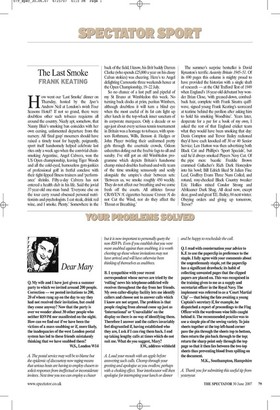Your Problems Solved
Dear Maly Q. My wife and I have just given a summer party to which we invited around 200 people. Correction — we posted invitations to 200, 20 of whom rang up on the day to say they had not received their invitation, but could they come anyway? Now that the party is over we wonder about 30 other people who neither RSVPd nor manifested on the night. How can we find out if we have been the victims of a mass snubbing or if, more likely, the inadequacies of the west London postal system has led to these friends mistakenly thinking that we have snubbed them?
WS., London W14 A. The postal service may well be to blame but the epidemic of discourtesy now raging means that serious hosts are having to employ chasers to solicit responses from ineffectual or inconsiderate invitees. Next time you too can employ a chaser but it is now important to personalOr query the non-RSVPs. Even ifyou establish that you were more snubbed against than snubbing it is worth cheering up those whose invitations may not have arrived and will have otherwise been thinking of themselves as snubbees.
B. I sympathise with your recent correspondent whose nerves are tried by the 'rolling' news his telephone-addicted wife receives throughout the day from her friends. My own caller-display facility lets me identify callers and choose not to answer calls which I know are not urgent. The problem is that people ringing from abroad come up just as 'International' or 'Unavailable' on the display so there is no way of identifying them. Therefore I answer and the callers invariably feel disgruntled if, having established who they are, I ask if I can ring them back. lend up taking lengthy calls at times which do not suit me. What do you suggest, Mary?
EW., address withheld A. Load your mouth with an apple before answering such calls. Chomp through your greeting and apologise as you swallow, perhaps with a choking effect. Your interlocutor will then apologise for interrupting your lunch or dinner and be happy to reschedule the call.
Q. I read with consternation your advice to K.F. to use the paperclip in preference to the staple. I fully agree with your comments about the ungentlemanly staple, yet the paperclip has a significant drawback; its habit of collecting unwanted pages that the clipped papers are placed on. This was recognised in the training given to me as a supply and secretariat officer in the Royal Navy. The implement was referred to as a 'Court Martial Clip' — that being the fate awaiting a young Captain's secretary if, for example, he dispatched a report of proceedings to the Flag Officer with the wardroom wine bills caught behind it. The recommended practice was to use a simple pin of the sewing variety. To join sheets together at the top left-hand corner pass the pin through the sheets top to bottom, then return the pin back through to the top; return the sharp point only through the top page so that it then lies between the two top sheets thus preventing blood from spilling on the document.
M.K., Southampton, Hampshire A. Thank you for submitting this useful tip from yesteryear:


















































































 Previous page
Previous page